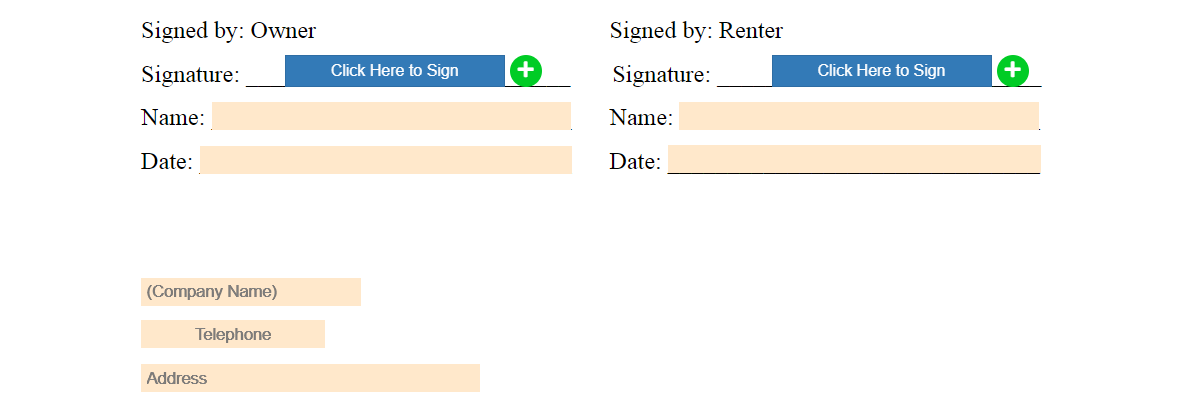Fillable Form Eviction Notice
An Eviction Notice is a letter to either comply with your rental or lease agreement or vacate the property. Providing it to a tenant is the first step of the eviction process.
Fill and sign Eviction Notice online and download in PDF.
What is an Eviction Notice?
An Eviction Notice is a document that a landlord, owner, or property manager gives to a tenant to terminate a rental agreement due to a violation. By definition, eviction is the process of lawful removal of a tenant from a residential property due to his or her failure to abide by the agreed-upon terms listed in a rental contract, including failure to pay rent or rent on time, overstaying, and conducting illegal activities within the property.
A court order is needed before a landlord can evict a tenant. Keep in mind that every state has laws and procedures that landlords should follow for the lawful removal of a tenant. Other instances even require a judge to issue an official court order stating that police or law enforcement officer may forcibly remove a tenant and belongings from a property.
The purpose of an Eviction Notice is to ask a tenant to fix a problem or violation of a term or condition in a rental agreement, giving him or her a chance to solve it before it escalates — known as “curable” notice, or to move out of the property by a specific date — known as “incurable” notice. Upon receiving the formal letter, the tenant only can only either comply or vacate the property.
Before taking matters into your own hand by committing unlawful actions, such as changing locks or forcefully removing a tenant from the property, which may result in legal repercussions, you must first review the laws that your state enforces.
Writing an Eviction Notice is the first step of the eviction process. Therefore, when writing the letter, you must clearly indicate the reason for eviction; the reason should be lawful and non-discriminatory. While an Eviction Notice can accomplish an end goal, it pays to avoid using it and resolve problems outside the court. Talking to the tenant and asking his side can enlighten and solve problems. Nevertheless, for cases and disagreements that cannot be solved, an Eviction Notice can be beneficial.
How to fill out an Eviction Notice?
Get a copy of Eviction Notice template in PDF format.
An Eviction Notice lets a tenant know that he has the option to fix a problem or vacate the rented property. For clarity, it should be easy to understand and contains key information as to why a landlord has issued one.
To help you create an Eviction Notice, we have a template that you can fill out. Use the guide below to complete the Eviction Notice template easily and correctly.

Step 1:
Provide the name of the tenant.
Step 2:
For the first section, you must provide the name of the company that manages the property that the tenant is renting and the complete address of the property.

Step 3:
Indicate the reasons why you are evicting the tenant. By providing additional explanations, the tenant will better understand the purpose of the letter.

Step 4:
Provide the necessary dates to determine the number of days a tenant can protest or solve the stated issue.

Step 5:
Both the landlord or property manager and the tenant need to sign and date the document to make it valid.
Step 6:
At the end of the notice, provide contact information.
Start filling out a Eviction Notice sample and export in PDF.
Frequently Asked Questions About an Eviction Notice
Is an Eviction Notice legal?
Yes, an Eviction Notice is legal.
Receiving an Eviction Notice from your landlord is legal. If your landlord asks you to leave the rental unit, an Eviction Notice is part of your eviction proceedings.
You should review the Eviction Notice carefully to identify what it requires of you. Then contact your landlord in writing to inform him or her when you will be leaving the rental unit. If your notice period runs out and you have not moved out, you may be faced with court eviction proceedings. Note that eviction notice day does not include the last date that rent is paid or notice is given, just the date when you need to leave.
There are also instances that your landlord may use an Eviction Notice to notify you in writing to correct your negative behavior, or else you must leave the premises. Such notice is also legal, provided that it contains specific information about the violation. You can either comply or if you disagree, you must give your landlord notice in writing of your intention to leave.
Is a verbal Eviction Notice legal?
While there is no provision in the law that prohibits verbal notice for eviction, many lawyers recommend against it. They suggest you provide an Eviction Notice in writing, so you have proof if issues arise about your eviction.
Can an Eviction Notice be canceled?
Yes, an Eviction Notice can be canceled at the request of both the landlord and the tenant.
However, like all other terms in a lease agreement, both the landlord and the tenant must agree, willingly and knowingly. Since an Eviction Notice is the beginning of the eviction process, the tenant and the landlord can agree to resolve the issue before notice day arrives.
Tenants do not have the right to cancel an Eviction Notice unless he or she disputes the matter to a court and the court rules in his or her favor.
What happens if I stay when my Eviction Notice expires?
If notice day passes and you have not moved out, your landlord is able to file eviction proceedings against you in court.
What are the reasons for receiving an Eviction Notice?
There are many reasons why your landlord may send you an Eviction Notice, but most of them involve your behavior. If you have done any of the following, your landlord is authorized to give an Eviction Notice:
- committed waste against the rental property;
- breached or broken an important term in your lease;
- failed to pay rent or late fees;
- violated a law that materially affects the value, use, or enjoyment of the rental property;
- engaged in a drug-related or gang-related activity;
- used or allowed a tenant to use the property for an illegal purpose; or
- violated a law that materially affects the health or safety of other tenants.
If you believe that the Eviction Notice does not comply with any of the above reasons, you should contact your landlord in writing to inform him or her. You can also find information pertaining to notice day if it is mentioned in your lease contract.
If you do not leave the premises on or before the notice day, your landlord can file a lawsuit against you in court.
Can an Eviction Notice be negotiated?
Yes, an Eviction notice can be negotiated provided that you are in agreement with your landlord should he or she agree to take it back. Otherwise, the Eviction Notice cannot be undone unless there was a mutual mistake in the Eviction Notice given by the tenant or landlord or if it was improperly given.
However, it is best to get written notice from your landlord of his or her intention to cancel the Eviction Notice. Otherwise, if notice day passes and you have not moved out, your landlord will be able to file eviction proceedings against you in court.
Note that notice can only be canceled when both the tenant and the landlord agree on its cancellation.
Is an Eviction Notice the same as a Notice to Quit?
No, an Eviction Notice is different from a Notice to Quit.
A Notice to Quit refers to a notice that tells you to leave the premises before your lease expires. An Eviction Notice is given during the course of your lease. It specifies the date when you should move out, whether it is on or after notice day. If notice day passes and you have not moved out, your Eviction Notice becomes a Notice to Quit. A Notice to Quit will tell you to leave by a certain date, or your landlord will file eviction proceedings against you in court.
Is a 5-day Eviction Notice legal?
Yes, a five-day Eviction Notice is legal.
A five-day Eviction Notice is served when a tenant fails to pay the rent, commits waste against the rental property, or engages in an activity that violates a law materially affecting health and safety. It will tell you what you did wrong and give you five days to correct your mistake or move out.
The only time a five-day Eviction Notice will be illegal is if it was served for no cause. It means that the landlord has no reason to evict you, which is not allowed by law.
Is a 30-day Eviction Notice legal?
Yes, a 30-day Eviction Notice is legal.
A 30-day Eviction Notice is a notice that tells you to leave the premises on or before 30 days. It is served for all the reasons mentioned above except when you have not paid rent.
Also, keep in mind that if you receive a 30-day Eviction Notice for nonpayment of rent, the notice cannot become a Notice to Quit until ten days after the notice date.
A 30-day Eviction Notice is usually served when there is no cause for eviction.
Can I stop eviction with an Eviction Notice?
It may be possible to cancel the Eviction Notice by fixing the problem mentioned in the notice. For example, if your landlord sends you a three-day Eviction Notice for failure to pay rent and you can get caught up on your payments by paying the rent within the three days, your landlord may waive the eviction proceeding.
However, if your landlord does not agree to waive the Eviction Notice after you have paid the rent, there is nothing you can do to stop the eviction from taking place. In this situation, you can move out voluntarily, or your landlord will have to file a lawsuit against you in court. However, if you believe that your landlord is unlawfully evicting you, you may file a case in court regarding the unlawful eviction.
Is it legal to evict someone without an Eviction Notice?
No, it is not legal to evict someone without an Eviction Notice.
If you are in a lease agreement, you can only be evicted if the eviction is legal. An Eviction Notice must be served to carry out the eviction proceedings, which allows you time to correct your mistake or move out. For example, if your landlord wants to evict you for failure to pay rent, you will usually get a five-day Eviction Notice. If you do not pay the rent within five days, your landlord will likely require you to leave the rental unit. Otherwise, you will face eviction proceedings in court.
In this situation, it is best to seek advice from a lawyer before eviction day to avoid any negative consequences.
In most states, the Eviction Notice time will be a minimum of three days. Few states have increased this to five days. If you receive an Eviction Notice from your landlord that does not tell you when to leave or what mistake you have made, then it might not be legal. In most cases, if there is no valid reason for eviction in the notice, your landlord may be trying to evict you illegally. But it can be hard to determine if eviction without an Eviction Notice is legal because every case will depend on the circumstances surrounding eviction.
Can Eviction Notice be sent by email?
Yes, an Eviction Notice can be sent by email. However, it is not advisable to send an Eviction Notice by email. In this case, it may be possible for the tenant to claim that he or she did not receive the notice because of a technical error or some other reason.
While some states may allow email as a means of serving an Eviction Notice, it may still be a better idea to mail out the Eviction Notice instead. It will help you avoid any problems concerning whether or not the tenant received the Eviction Notice.
On the other hand, if you have been evicted from your rental unit and want to sue your landlord for illegal eviction proceedings, you need to prove that you did not receive the notice.
If you can prove that you did not get an Eviction Notice by email, then your landlord may be held liable for failure to give proper eviction notice and unlawful eviction proceedings.
Many states consider it illegal to evict a tenant without providing an Eviction Notice. If you face eviction from your rental unit without receiving an Eviction Notice, you may have a good claim against your landlord for wrongful eviction.
If you are in this situation and want to sue your landlord for illegal eviction proceedings, make sure that you keep records of everything, including emails.
Can an Eviction Notice be reversed?
Yes, you can reverse an Eviction Notice. Many states require that landlords give notice before filing a case in court for eviction proceedings. This time period is called the notice period, and it must expire before your landlord can file a lawsuit to evict you from your rental unit.
If this notice requirement is not met, the eviction proceedings may be invalidated, and your landlord may be held liable for wrongful eviction.
Can an Eviction Notice be mailed?
Yes, you can mail an Eviction Notice. Federal law requires that all landlords attempt to deliver Eviction Notices by certified mail. This way you will have proof that an Eviction Notice was served and proof of service.
Sending an Eviction Notice by certified mail is the safest way to send such a notice because it provides a trail of action. It is helpful if your tenant denies that he or she received your Eviction Notice.
Can an Eviction Notice be left on the door?
In most cases, an Eviction Notice cannot be left on the tenant's door. An Eviction Notice must be mailed out to the tenant or served personally. It is not legal to leave an Eviction Notice on a tenant's door unless you do it after a failed attempt to give an Eviction Notice personally.
Can a landlord evict a tenant immediately after an Eviction Notice is given?
No, a landlord cannot evict a tenant immediately after giving an Eviction Notice. State laws have different periods of time that must expire before the eviction proceedings can begin. Some states give as little as three days, while others require as long as 30 days for the proper eviction notice to be given.
When can an Eviction Notice be served?
An Eviction Notice can be served when a tenant violates a provision in the lease. If a tenant fails to pay rent, has unauthorized guests, or creates a disturbance on the rental premises, a landlord can serve an Eviction Notice to end the tenancy before going through eviction proceedings.
Can an Eviction Notice be sent by text?
No, you cannot send an Eviction Notice through text messaging. It is not legal to evict a tenant through text messages or social media. Legal eviction proceedings must always go through the mail or in person.
Text messaging does not hold up in court because it does not fulfill the specific statutory requirements for a legal eviction notice.
How to serve an Eviction Notice?
State laws require that an Eviction Notice be handed to a tenant personally or sent by certified mail with a receipt of mailing or attempted delivery.
An Eviction Notice is only effective when it is served properly to tenants. It is vital to understand the notice period of your state before serving an Eviction Notice.
How does an Eviction Notice work?
When a tenant violates the terms of the lease, it is grounds for eviction. Once an Eviction Notice has been served to a tenant in violation, he or she must comply within the notice period or be forcibly removed from the rental unit by law enforcement officers.
Most states require that landlords provide at least one month of notice before filing an eviction case in court.
An Eviction Notice is a legal document that informs tenants that they are in violation of the lease agreement. It details what rules have been violated and how long the tenant has to resolve the problem depending on their state's laws.
How to file an Eviction Notice?
It depends on your location. In most cases, you will need to go to city hall and fill out some paperwork or contact a local rental assistance agency for assistance in filing an Eviction Notice.
Some states require that Eviction Notices be filed with housing courts and other counties while others do not have any requirements at all.
Will an Eviction Notice affect my credit?
An Eviction Notice can appear on a tenant's credit report if the eviction issue is taken to court or if their landlord files an eviction case against them. While this does not affect credit scores directly, it can lead to a decline in credit scores.
Tenants may be eligible for a negative notation removal if the eviction case was dismissed or won. In both cases, it is vital to retain evidence of eviction disputes and court decisions so that tenants can be properly evaluated by credit bureaus.
Can you fight an Eviction Notice?
Tenants can fight an Eviction Notice, but it is not recommended. Fighting an Eviction Notice will prolong the time that a tenant spends in court, and depending on the circumstances of their case, they may end up paying more money in lawyer fees.
It is always best to comply with the Eviction Notice as soon as possible because further enforcement only makes the eviction process more difficult.
Is an Eviction Notice filed with the court?
No, when a tenant is served with an Eviction Notice, it does not necessarily go to court. An Eviction Notice only informs tenants of their rules violations and states that they can resolve the situation with their landlord within a specific time period or be forcibly removed from the premises.
How long does an Eviction Notice last?
The length of time that an Eviction Notice lasts depends on your state's laws. Tenants should be aware that eviction may become permanent if they are taken to court, and their landlord wins the case against them.
An Eviction Notice usually lasts for 30 days, but it may depend on local laws, so tenants should check with county law enforcement before assuming that their notice lasts only 30 days.
How quickly can my landlord evict me?
Under normal circumstances, your landlord can file eviction cases within a month of you violating his or her rules. In some situations, this time frame may be shorter or longer depending on local laws and how complex the case is.
It might take a while to resolve an eviction case in court, even if your landlord files for eviction soon after you violate his or her lease agreement.
More importantly, your landlord can file eviction cases without serving an Eviction Notice if you have committed serious violations like assaulting other tenants, damaging property, or endangering their lives.
Do you have 30 days after receiving an Eviction Notice?
Eviction Notices usually include a specific time period during which tenants have to resolve issues with their landlord or vacate the property on their own or be forcibly removed by law enforcement officers. The days you have after receiving the Eviction Notice depend on the notice period stated on the notice.
Can I evict a tenant myself?
As a general rule, landlords must go through the appropriate legal channels when evicting tenants, including the courts and law enforcement agencies.
Some states might allow you to handle eviction yourself in some cases, but this is highly discouraged because it could lead to problems in the future.
Do I need a reason to evict someone?
You can evict tenants for violating their lease agreements or failing to pay rent. In some jurisdictions, you are permitted to evict tenants without giving an explanation. For this purpose, you can draft a 30-day Eviction Letter.
However, it is not recommended to evict a tenant for no good reason because it may backfire on you and may lead to illegal eviction cases filed against you.
What happens if a tenant refuses to leave?
Tenants who violate their lease agreements and refuse to leave the property on time will be forcibly removed.
In most cases, it is recommended that landlords file eviction cases in court instead of attempting to evict tenants themselves because of possible legal problems.
Can you be evicted for having a messy house?
Yes, you can be evicted for having a messy house if it violates your lease agreement with your landlord. In most cases, landlords ask tenants to maintain a clean and tidy household at all times.
How can I evict a tenant fast?
When you need to evict a tenant as soon as possible, you can file a three-day Eviction Notice. After three days, you can go to court and file eviction papers asking for expedited eviction if the tenant refuses to comply with your terms and conditions.
The court normally grants these cases, resulting in tenants being forcibly removed from the property by law enforcement officers within a week. The judge may rule for eviction as soon as he or she considers your case appropriate based on the situation at hand.
What do you say when evicting someone?
When you want to evict a tenant, you can state in your Eviction Notice the following:
- the reason for eviction;
- the date and time of eviction; and
- the consequences if the tenant contests your eviction case.
When filing eviction cases, it's a good idea to state all the facts in your favor and have reliable evidence to back them up. It will help you win your case faster if tenants decide to challenge your claims.
Create a Eviction Notice document, e-sign, and download as PDF.
Keywords: eviction-notice notice-of-eviction eviction-notice-form eviction-notice-template real-estate-eviction-notice
















